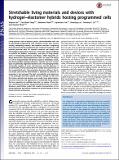Stretchable living materials and devices with hydrogel–elastomer hybrids hosting programmed cells
Author(s)
Liu, Xinyue; Tang, Tzu-Chieh; Tham, Eleonore Claire Cecilia; Yuk, Hyunwoo; Lin, Shaoting; Lu, Timothy K; Zhao, Xuanhe; ... Show more Show less
DownloadLiu-2017-Stretchable living materials and devi.pdf (1.167Mb)
PUBLISHER_POLICY
Publisher Policy
Article is made available in accordance with the publisher's policy and may be subject to US copyright law. Please refer to the publisher's site for terms of use.
Terms of use
Metadata
Show full item recordAbstract
Living systems, such as bacteria, yeasts, and mammalian cells, can be genetically programmed with synthetic circuits that execute sensing, computing, memory, and response functions. Integrating these functional living components into materials and devices will provide powerful tools for scientific research and enable new technological applications. However, it has been a grand challenge to maintain the viability, functionality, and safety of living components in freestanding materials and devices, which frequently undergo deformations during applications. Here, we report the design of a set of living materials and devices based on stretchable, robust, and biocompatible hydrogel–elastomer hybrids that host various types of genetically engineered bacterial cells. The hydrogel provides sustainable supplies of water and nutrients, and the elastomer is air-permeable, maintaining long-term viability and functionality of the encapsulated cells. Communication between different bacterial strains and with the environment is achieved via diffusion of molecules in the hydrogel. The high stretchability and robustness of the hydrogel–elastomer hybrids prevent leakage of cells from the living materials and devices, even under large deformations. We show functions and applications of stretchable living sensors that are responsive to multiple chemicals in a variety of form factors, including skin patches and gloves-based sensors. We further develop a quantitative model that couples transportation of signaling molecules and cellular response to aid the design of future living materials and devices.
Date issued
2017-02Department
Massachusetts Institute of Technology. Soft Active Materials Laboratory; Massachusetts Institute of Technology. Department of Biology; Massachusetts Institute of Technology. Department of Electrical Engineering and Computer Science; Massachusetts Institute of Technology. Department of Materials Science and Engineering; Massachusetts Institute of Technology. Department of Mechanical Engineering; Massachusetts Institute of Technology. Research Laboratory of ElectronicsJournal
Proceedings of the National Academy of Sciences
Citation
Liu, Xinyue et al. “Stretchable Living Materials and Devices with Hydrogel–elastomer Hybrids Hosting Programmed Cells.” Proceedings of the National Academy of Sciences 114, 9 (February 2017): 2200–2205 © 2017 National Academy of Sciences
Version: Final published version
ISSN
0027-8424
1091-6490